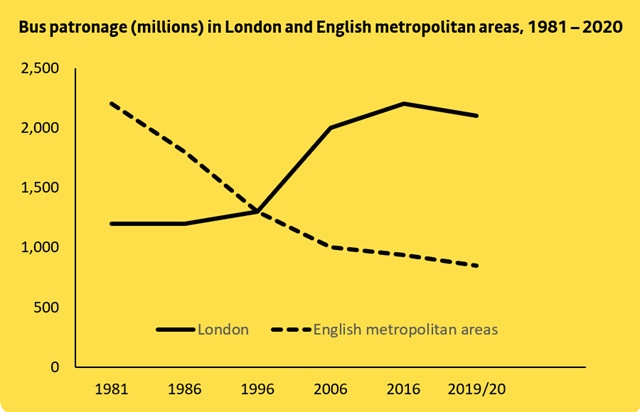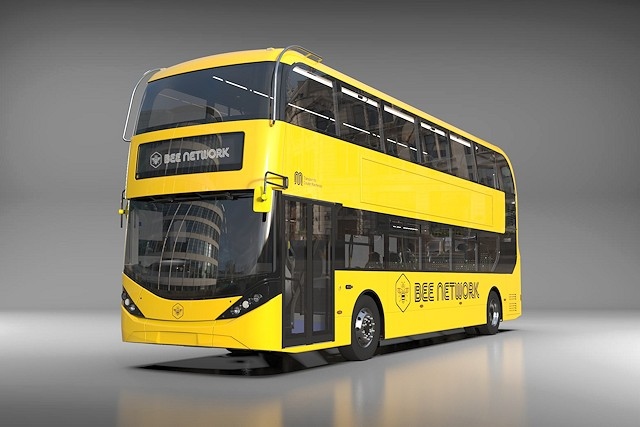Greater Manchester becomes first place in England to retake control of buses after 40 years of deregulation with historic Bee Network launch
Date published: 25 September 2023

Greater Manchester mayor Andy Burnham with Bee Network branding
Greater Manchester has become the first place in England to re-take control of its buses after nearly 40 years of deregulation, with the launch of the historic Bee Network – ushering in radical improvements to the city-region’s public transport network.
As part of the Bee Network, joint tram and bus travel is now 20% cheaper with a new AnyBus + tram ticket. This comes after the Mayor announced £2 capped adult fares for all Greater Manchester bus services in 2022.
The introduction of locally-controlled bus services marks the first time in England that bus deregulation, which has led to declining bus services and passenger numbers across the country, has been reversed. In the nearly 40 years since deregulation, the number of bus journeys in Greater Manchester dropped from around 355m to 182m in 2019.
England’s other city-regions experienced a similar downward trend in this period, with journeys more than halving, from a total of 1,810m to 845m. The number of bus journeys in London, where buses were not deregulated, roughly doubled in the same period, from around 1,164m journeys in 1986 to 2.1bn at the end of the decade.

Operating initially in Bolton, Wigan and parts of Salford and Bury - with a few services passing into the Rochdale borough - the launch of the first franchised bus services represents the start of the Bee Network – Greater Manchester’s plan for an integrated, low-cost, high-frequency public transport network, bringing together local trams, buses and bikes – and ultimately local train services – with the largest walking, wheeling and cycling network anywhere in the UK.
Passengers will see notable changes, including:
- 50 new electric buses operating in the first franchised area – with several hundred more delivered over the next few years.
- Improved services for passengers, including earlier and later, more frequent and better integrated bus services connecting passengers with first and last tram and train services.
- Improved customer services, with a new Bee Network customer contact centre and a new website and app, providing live information for all local bus, tram and train services.
- A more accountable service, with passengers able to rate their journey. Levels of customer complaints are amongst a range of customer-related performance targets used to inform what operators get paid.
- New Travelsafe Enforcement Officers to help people get used to the new system, ensure they feel safe and prevent fare evasion.
- Having a single brand identity, with new staff uniforms and a simpler, integrated fares structure.
The Bee Network is being delivered in three phases, with bus services in Rochdale, Oldham, Bury and parts of Manchester, Salford and Tameside to come under local control from 24 March – and the rest of the city-region from January 2025.
Transformed bus services are part of a wider plan for a more accessible and integrated network, bringing together buses trams – and ultimately local rail services – with the largest cycling, walking and wheeling network in the UK. Integrating all these modes will enable passengers to make seamless journeys across the public transport network.
Once franchising is complete, passengers will be able to touch in and out on any bus or tram service in Greater Manchester and have their fare automatically be calculated up to the daily cap.
Work is also already underway to bring local train services under local control by the end of the decade. The first step will see a payment pilot on train services between Stalybridge and Victoria, and Glossop and Piccadilly that will, for the first time, allow passengers to touch-in and out at the start and end of their journey and have their fare automatically worked out for them.

Enabling people to walk, wheel and cycle is a key part of the Bee Network, with Greater Manchester aiming to connect every area and community with 1,800 miles of safe routes and 2,400 new crossings. One complete, the routes and crossings will form the biggest cycling, walking and wheeling network in the country.
Since 2019, more than 50km of walking and cycling routes have been built across the 10 boroughs, with a further 50km due to be delivered by the end of 2024.
As well as representing the biggest shake-up of public transport in almost four decades, the launch of the Bee Network is the most significant and visible change brought about through English devolution.
Speaking on Sunday (24 September), Mayor of Greater Manchester, Andy Burnham, said: “For nearly 40 years we have seen worsening services and plummeting passenger numbers on our buses. We’ve had to reckon with a deregulated bus network that cuts vital services that connect communities to jobs, hospitals and opportunities on a whim - leaving local leaders with limited budgets to pick up the tab to keep these routes alive. Today marks the end of that era with our franchised system representing better value for money for city-regions and a better service for passengers.
“From today passengers will experience our new electric buses as well as earlier and later, more frequent and better integrated services. We’ve already cut the cost of public transport with the capped fares I introduced in 2022, but from today our new AnyBus + tram ticket will also make joint tram and bus travel 20% cheaper.
“We’re also putting power back in the hands of people, with passengers able to rate their journey. These ratings, combined with a range of other customer-related performance targets will be used to inform what operators get paid.
“Today is a coming-of-age moment for English devolution. With the launch of the Bee Network, Greater Manchester is blazing a trail for other city-regions who are ready to follow our lead in reversing the failed bus deregulation experiment and creating an integrated transport network that is run in in the interests of, and accountable to, our communities.
“I’d like to extend my thanks to all those who have worked tirelessly over many years to make the Bee Network possible.”
Do you have a story for us?
Let us know by emailing news@rochdaleonline.co.uk
All contact will be treated in confidence.
Most Viewed News Stories
To contact the Rochdale Online news desk, email news@rochdaleonline.co.uk or visit our news submission page.
To get the latest news on your desktop or mobile, follow Rochdale Online on Twitter and Facebook.


